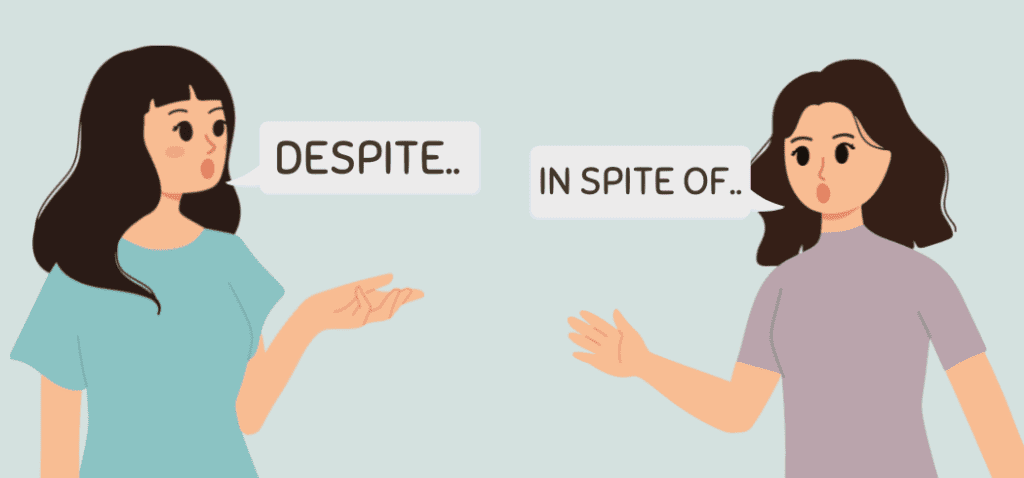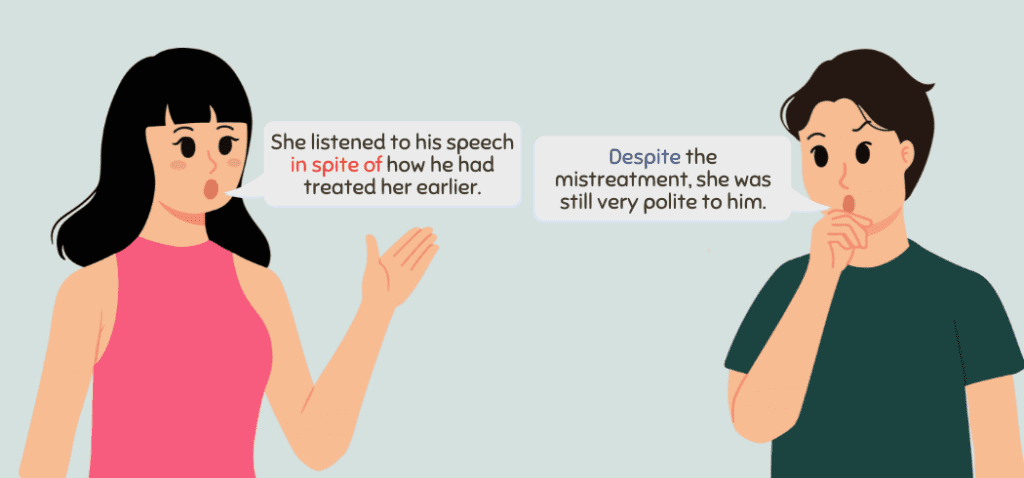The English language has a few words and phrases that, when used, mean the same thing. Often, their use is interchangeable and up to the author’s discretion.
Despite and in spite of are examples of this, and even though some people will argue that they each have particular rules, modern use dictates they mean the same thing. The only rules you need to follow are grammatical in reference to parts of speech.
We explain this all below, along with plenty of examples to help you properly use either of these terms.
What Is the Difference Between Despite and In Spite Of?

The quick answer to knowing the difference between despite and in spite of is that despite is one word, while in spite of is three.
According to the Oxford English Dictionary, they both mean “without being affected by the particular factor mentioned,” but arguably can be used to highlight the tone of the sentence within which they are used. Each had a more specific use in the past, which we explore later in the article.
They both are prepositions and are usually interchangeable in their use. For writers who value brevity, despite is better. There’s nothing wrong with in spite of, and sometimes the three-syllable term sounds better than the two-syllable one.
Today, choosing one over the other simply comes down to personal preference.
For example:
- We struggled financially last year despite being very responsible with our money.
- We struggled financially last year in spite of being very responsible with our money.
You can also substitute any of the following synonyms for either term. However, you may need to alter your sentences to make them sound correct.
- Notwithstanding
- Even though
- Regardless of
For example:
- We struggled financially last year regardless of being very responsible with our money.
- We struggled financially last year even though we were very responsible with our money.
How to Use Despite and In Spite Of in Sentences

Despite and in spite of are prepositions, meaning they come before a noun, pronoun, or noun phrase and either introduce an object or explain time, place, direction, location, or spatial relationships. In this case, despite and in spite of usually show a contrast or relationship of some sort.
Prepositions are always found at the beginning or the middle of a sentence. They show the relationship between an independent clause and a dependent clause and are always placed before the dependent clause.
For example:
- In spite of the sudden icy weather, we chose to drive across the state to celebrate our best friend’s birthday; luckily, the drive was uneventful.
- We chose to drive across the state to celebrate our best friend’s birthday despite the sudden icy weather; luckily, the drive was uneventful.
There are also certain parts of speech that should always follow the placement of a preposition.
Nouns
Nouns are a person, place, thing, or idea.
- She was drinking iced coffee despite the freezing temperatures.
Gerunds
Gerunds are a verb form that ends in -ing and is used as a noun.
- Despite my exercising, I still wasn’t meeting my weight loss goals.
How, what, who, why, where, when phrases
- She listened to his speech in spite of how he had treated her earlier.
Changes to the Terms Over Time
We mentioned above that there used to be more specific uses of despite and in spite of in the past. How we use words changes over time, and even though some people may have been taught the use of certain phrases one particular way, it doesn’t mean those suggested rules are adapted to all of society.
The main difference between the use of despite and in spite of that is often argued that in spite of is supposed to explain the contrast between a positive clause to a negative clause.
For example:
- In spite of her excellent grades, Monica was still required to take a summer course if she wanted to graduate on time.
Despite is supposed to create a contrast between a negative clause to a positive clause.
For example:
- The rainy day ruined their plans to explore the old ruins despite the company telling them they could still take the tour no matter the weather.
Inspite vs. Despite
If you are curious about the difference between inspite and despite, don’t be. Inspite is not a word despite the fact that some people have taken “in spite of” and wrongly forced the phrase into a one-word form.
Review and Rules to Consider
Despite and in spite of mean the same thing and can be used interchangeably, no matter how often a person argues they learned differently. The bottom line remains: you can use either word to your personal preferences to declare “without being affected by the particular factor mentioned.”
Keep in mind that they are prepositions and must follow the rules of prepositional use. Some other things you might want to consider are:
- Despite, a one-word phrase, is more often used than in spite of, a three-word prepositional phrase.
- Never place the word “of” after despite. It only belongs in the phrase in spite of.

Comments are closed.